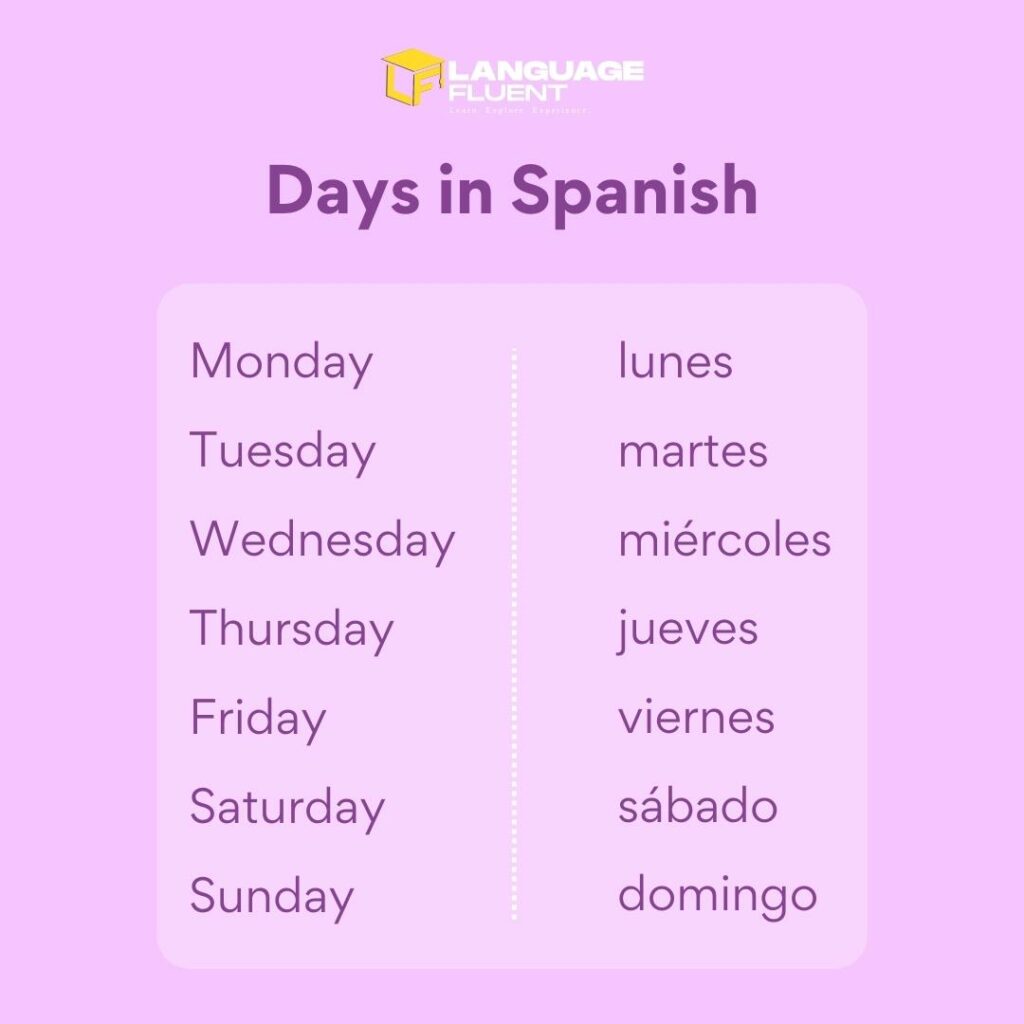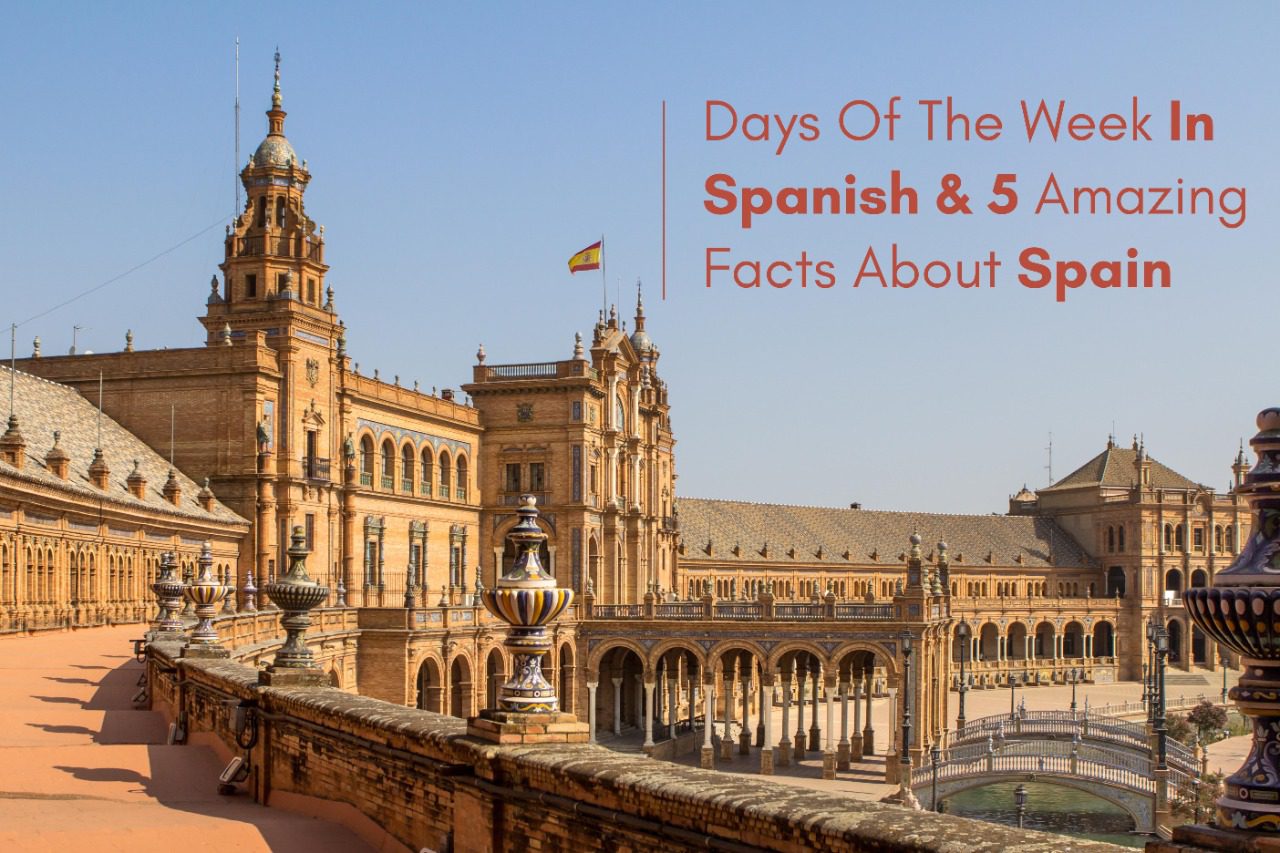The first step for novices is to become familiar with the Spanish expressions for the various days of the week. This could be your first step in creating your home-immersion environment. Because of their origins in Greco-Roman culture, the majority of the days of the week in Spanish are named after celestial bodies.
15 Ways To Learn Spanish Through Immersive Learning
Spanish Days Of The Week

Monday – lunes
“Monday” in Spanish is lunes, derived from the word luna, which means “moon.” Monday is derived from the word “moon” in German, English, Japanese, and several other languages. Remembering this can help you not forget that Monday is lunes!
And, like the German calendar, the Spanish calendar begins on lunes rather than Sundays. Saturday and Sunday are “the weekend” and rest days, so this makes sense. It makes more sense to start the week on Monday when you return to work.
Tuesday – martes
Numerous days of the week are derived from the names of mythological gods. The Spanish word for Tuesday is martes, derived from dies Martis, or Mars, the Roman god of battle. This is distinct from the English. Tuesday derives from the Norse deity Tyr. If you are interested in mythology, remember that Tuesday is the day of the god of battle.
Wednesday – miércoles
Wednesday is miércoles, named after Mercury, the Roman god of wealth and deception. El miércoles can also express “midweek” in Spanish, while la entresemana is equally acceptable.
Thursday – jueves
Jupiter’s day is Thursday or jueves in Spanish. It is Thor’s day in English, and both are thunder gods. Because the Spanish days of the week are not cognates (words related to English), it may be helpful to establish links between the gods they are named after.
Friday – viernes
“Friday” is viernes in Spanish. Can you guess which legendary Roman deity this day honors? Venus is the goddess of love and beauty.
Venus, although less well-known, is also the goddess of prosperity. Thinking about Friday as Pay Day, which brings money and success, might help you recall viernes.
Saturday – sábado
Saturday is sábado in Spanish. Instead of a god, it is termed “Sabbath” in defiance of tradition. (Saturday is derived from the Roman deity Saturn.) The biblical Sabbath is a day of rest, devoid of labor. Even if you are not religious, many individuals take their first day off on a Saturday.
Sunday – domingo
The Spanish word for “Sunday” is domingo, which derives from the Latin root Domenica. It translates to “the Lord’s Day,” hence both weekend days have biblical origins.

How To Say Today, Tomorrow, and Yesterday in Spanish
There are other Spanish terms connected to dates that you should know. To say “today” in Spanish, you would say hoy. You may use it to inquire about the day or date, for example:
What day is today? – ¿Qué día es hoy?
What is the date today? – ¿Cuál es la fecha de hoy?
Today is Sunday. – Hoy es domingo.
The date is January 1. – Hoy es primero de enero.
“Tomorrow” is mañana in Spanish. Mañana also means “dawn” in Spanish, which might be misleading. Keep this in mind since you must understand the distinction through context.
If you wish to discuss “the day after tomorrow,” use the phrase pasado manana. It means “the day after tomorrow.” However, if the future date is more than two days away, you should use en __ das. For example, “In five days” might be expressed as en cinco dias.
“Yesterday” in Spanish is ayer. Additionally, “the day before yesterday” is anteayer, which means “before yesterday.” For earlier days, you might say hace __ dias. Also, if it was “five days ago,” the phrase is hace cinco dias.
However, while talking about the past, you must use fue. Ayer fue mi cumpleaños, for example, means “Yesterday was my birthday.” Therefore, you use es (“is”) for hoy and fue (“was”) for ayer.
Spanish Grammar Utilizing the Weekdays
Let’s discuss the Spanish grammar associated with the days of the week.
The first thing you must learn is the gender of the weekdays. The days of the week are all masculine; thus, you will couple them with un, el, and los. This makes it simple: you don’t have to strive to remember their gender!
When using los to refer to days in the plural, only Saturday and Sunday are modified. Monday through Friday already finish with -s. Therefore, los lunes are used instead of el lunes when referring to many Mondays. Given that Saturday and Sunday do not end in -s, the suffix -s is added to make them plural. They became los sábados and los domingos.
You might use todos los lunes or cada lunes to mean “every Monday” in Spanish. They are identical, except cada means “each” and todos means “all.” It’s more typical to say todos los días, but each lunes is excellent, too. It has a subtle meaning that “each Monday,” you do something, or something occurs, as a routine or habit. And with cada, the article los is dropped.
Another point to note is that you do not use en for “on” when referring to Saturday or any other day of the week. It isn’t on sábado, but el sábado. And “from Monday to Friday” is expressed with de lunes a viernes. “De a __” represents “from to .”
You may have observed this by now: The Spanish language does not capitalize days. Except when appearing at the beginning of a sentence, they are always written in lowercase. In this scenario, it is correct to capitalize the initial letter of the first word.
How language learning can get you a high salary job
Spanish abbreviations for the days of the week
The days of the week are shortened in Spanish as L, M, X, J, V, S, and D. Miércoles is abbreviated with “M” or “X” depending on the nation and personal taste; “X” is used to prevent confusion with Tuesday. Occasionally Wednesday is even “Mx.”
You’ll also notice Lu, Ma, Mi. Ju, Vi, Sá, and Do, or occasionally the three-letter abbreviations Lun, Mar, Mié, Jue, Vie, Sáb, and Dom.
5 Amazing Facts About Spain
1. Increasing Spanish popularity in Asia
Approximately 18 million individuals are now studying Spanish. The need for Spanish increases constantly. Spanish gained popularity in Europe, North America, and Asia. Everyone became obsessed with the Spanish language in schools and universities, online programs, internet podcasts, and tutoring platforms.
After Chinese Mandarin and English, it has become the third most popular online language. Spanish is one of the world’s five simplest languages. Twenty-one speaking nations across three continents boost the likelihood of its popularity. Numerous interesting tourist places contribute to the factors mentioned above.
What are you waiting for if you belong to the minority that doesn’t speak or learn Spanish?
2. There are 21 Spanish-speaking nations worldwide
We are willing to wager that you do not know the names of all Spanish-speaking countries. This Romance language has its origins in Europe, North, Central, and South America, and possibly Africa. Spanish is the world’s fourth most widely spoken language, behind English, French, and Arabic.
With more than 450 million native speakers, Spanish is the world’s second most widely spoken language. In the US, more than 43 million individuals, or 13 percent of the population, speak Spanish as their native language. Despite these fascinating facts, you still do not know where in Africa Spanish is spoken.
12 Catchy Songs that Help You Learn Spanish Grammar and Vocabulary
3. Spanish is not Spain’s only official language

Although Spanish is the most widely used language in Spain, it is not the sole official language. Aranese, Basque, Catalan, and Galician are also co-official languages.
The Aranese language is a dialect spoken in northwestern Catalonia, the Basque language is expressed in the Basque Country in Northern Spain and Southwestern France, Catalan is spoken in Catalonia, Valencia, and the Balearic Islands, and Galician is spoken along the northwest coast of Spain.
Only Catalan is recognised as an official language in Andorra. During Franco’s dictatorship, speaking any language other than Spanish was forbidden, and many of these languages were repressed. With the return of democracy, these languages all returned to prominence.
Today, communication in these languages is acknowledged throughout the whole nation.
4. Significant Arabic impact on Spanish
The Arab conquest of the Iberian Peninsula, where Spain is located, began in 711 and lasted until 1492. Spanish and Arabic merged throughout time. Since Arabians also brought their art, architecture, culture, and language, Spain was greatly influenced.
Their impact on the language resulted in around 8,000 Arabic loanwords.
There are hundreds of Arabic origin place names in Spain and Spanish-speaking nations. Andalucia, Spain’s second-biggest autonomous community, is derived from the Arabic term for Muslim Iberia, Al Andalus.
Or Guadalajara, city, and province, derived from Arabic Wd al-ijrah, meaning River/stone canyon. Common Spanish names Almudena and Guadalupe have an Arabic derivation.
5. Spain is the largest olive oil producer in the world

With 44 percent, Spain is the leading producer of olive oil. This gives Spain the leader in olive oil production with 1.5 million tonnes. Even more astonishing is that ten percent of the world’s output originates from the Spanish region of Andalusia, Jean.
Therefore, the Spanish do not lack olive oil. Not only do they live longer, but they also cook delicious cuisine.
If you are looking forward to learning Spanish language online, within the comfort of your home, you’ve come to the right place. Just click here!











